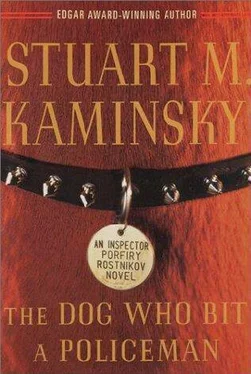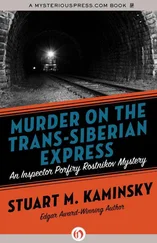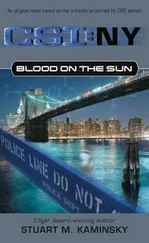Stuart Kaminsky - The Dog Who Bit a Policeman
Здесь есть возможность читать онлайн «Stuart Kaminsky - The Dog Who Bit a Policeman» весь текст электронной книги совершенно бесплатно (целиком полную версию без сокращений). В некоторых случаях можно слушать аудио, скачать через торрент в формате fb2 и присутствует краткое содержание. Жанр: Полицейский детектив, на русском языке. Описание произведения, (предисловие) а так же отзывы посетителей доступны на портале библиотеки ЛибКат.
- Название:The Dog Who Bit a Policeman
- Автор:
- Жанр:
- Год:неизвестен
- ISBN:нет данных
- Рейтинг книги:3 / 5. Голосов: 1
-
Избранное:Добавить в избранное
- Отзывы:
-
Ваша оценка:
- 60
- 1
- 2
- 3
- 4
- 5
The Dog Who Bit a Policeman: краткое содержание, описание и аннотация
Предлагаем к чтению аннотацию, описание, краткое содержание или предисловие (зависит от того, что написал сам автор книги «The Dog Who Bit a Policeman»). Если вы не нашли необходимую информацию о книге — напишите в комментариях, мы постараемся отыскать её.
The Dog Who Bit a Policeman — читать онлайн бесплатно полную книгу (весь текст) целиком
Ниже представлен текст книги, разбитый по страницам. Система сохранения места последней прочитанной страницы, позволяет с удобством читать онлайн бесплатно книгу «The Dog Who Bit a Policeman», без необходимости каждый раз заново искать на чём Вы остановились. Поставьте закладку, и сможете в любой момент перейти на страницу, на которой закончили чтение.
Интервал:
Закладка:
Rostnikov knew that the man being lowered into the ground must have treated his elders, since they included Casmir Chenko, with respect because he had little choice. Lashkovich, however, had abandoned his wife and teenage son five years earlier and never sent them a penny. The widow lived in Kazan, five hundred miles from Moscow, in what had been declared the Tatar capital. The widow lived by working in a belt factory. She was not present. As for his patriotism, a quick search had revealed that the dead man had paid no taxes. It might also be considered a less than chauvinistic act to murder citizens, as the dead man had made a career of doing.
“Look again, Raisa Munyakinova, please,” said Rostnikov, well under the voice of the man in the white gown who shifted in Russian to an almost tearful prayer.
“May God take the soul of this good man into his arms. May he receive in heaven all that he deserves for a life well spent in devotion and toil.”
“Amen to that,” said Rostnikov.
“I want to go now,” Raisa said. “I’m tired. I’m afraid.”
“One last look,” said Rostnikov, incredibly uncomfortable and trying to bear the brunt of the weight of his body with his good right leg, using the left one to simply maintain his balance.
She lifted her veil just enough to see out from under it and scanned the crowd once again.
“No,” she said, letting the veil drop. “He is not here. I am sure.”
Raisa had worked a full shift and it had been a difficult one. The Carpathian Bathhouse was nowhere near as well-maintained as the hotel health club where she had worked the night before and where the Tatar had died. She had expected another cleaning woman, Olga Sachnova, but the other woman had simply not shown up.
There had been debris and wet towels. The sinks and toilets weren’t filthy but they were not clean. She had put in an extra hour, though she would never be paid for it. She did not wish to lose her job, and she could not possibly bring herself to leave any sign of dirt behind her.
From the bathhouse, she had caught a bus and made it to Petrovka at the time designated for her meeting with the pale detective named Karpo. She had passed the police building hundreds of times and heard tales about the dark bowels of the building. Raisa did not want to enter, but she could not refuse. The guard at the gate had taken her name and made a call. Moments later Karpo had appeared and led her into the building for a nearly two-hour examination of the photographs of not only Chechin gangsters, but Tatars, Afghan veteran Mafia members, and dozens of Georgians, Moslems, Ukrainians, Estonians, and Russians of all ages. Nothing.
The casket was now resting on the dirt bottom of the grave and three Tatars were shoveling soil over it. The man in the white gown made a motion with his raised hand and the burial was over.
Rostnikov and Karpo had not been surprised by the appearance of the Chechins at a Tatar burial. The code of dishonor adopted loosely from an amalgam of American gangster movies required such an appearance and the presentation of a large flowery wreath to lay on the grave.
Two Chechins in their twenties were standing back with the ready wreath and a signal from Shatalov.
The service was over but no one moved.
Two of the Tatar men, hands folded in front of them, and a woman headed straight for the two policemen and the veiled woman.
“Please, please, please, let’s leave now,” Raisa said, gripping Rostnikov’s hand.
Her grip of fear was surprisingly strong.
The Tatar contingent stopped directly in front of Raisa, and the woman, who was young and very pretty, with Asiatic features, looked at Raisa, whose head was bent forward in a fear she hoped looked like grief.
“My father, Casmir Chenko,” the young woman said, “wants to thank you for coming. The journey must have been difficult. Your son was a very good man and a loyal friend. You should be very proud of him.”
The young woman lifted her right hand slightly and one of the young Tatars stepped forward, a letter-sized brown envelope in his hand. He handed the envelope to the young woman and stood back.
“My father wants you to have this, a small token of his respect for your son.”
Raisa wanted to look at one of the policemen to determine if she should refuse the gift. She couldn’t do so. She took the envelope and nodded. The young girl stepped forward and gave Raisa a hug, whispering in her ear, “Whatever your son may have told you, do not share it with these policemen who brought you here.
Valentin would not have wished it.”
The young woman was adept at such whispered messages, and while the two policemen had not heard the words, they had heard the voice.
“You are one of us too,” said Chenko’s daughter, looking at Emil Karpo. “A relative?”
“No,” he said.
“You are a Tatar,” she said, looking into the ghostly face.
“I am a Russian,” Karpo said.
“Then you are a traitor,” she said.
Chenko’s daughter stepped away and the two young men followed her back toward the grave site, where the last of the dirt was being shoveled.
“What am I to do with this?” asked Raisa.
“Keep it,” said Rostnikov.
“It is evil money,” Raisa said.
“It is money,” said Rostnikov. “It can now be used to ease your life a bit. If you wish, give it to a worthy cause or someone more in need of it than you, if you can find such a person.”
“She said it was because my son is dead,” Raisa said.
“Consider it a mistake on their part which can benefit a woman who has to hold on to many jobs to live,” said Rostnikov. “These people do not do good things unless they have made a mistake.”
Raisa clutched the envelope as both policemen looked away from her toward the grave upon which the two Chechins with the massive floral wreath were advancing. From the other side of the grave three Tatars stepped forward and stood in a line.
The Chechins laid the wreath on the mound and stepped back.
Immediately, the three Tatars picked up the wreath and threw it in the direction of the gathered Chechins. The wreath did not sail because of its weight, but skidded on the grass and halted in front of Shatalov, who stepped forward and said loudly with a tone of mock disappointment, “Bad manners, One Eye.”
“Bad manners indeed, Irving,” said Chenko.
The mask of disappointment left Shatalov’s face and was replaced by a cold, threatening stare. Shatalov smiled, raised his right hand, and motioned as if to an army he wished to follow him into battle. One young man with something in his hand moved forward to the flower-covered grave and in the plot next to it plunged a stake bearing a small, neatly printed sign reading, VACANCY.
Even before they could read the sign, the Tatars, led by Casmir Chenko, had begun to advance. Shatalov’s men also stepped forward behind their leader.
The policemen with automatic weapons moved quickly between the two groups.
“Halt,” called the officer in charge, glancing at Rostnikov and Karpo for some direction.
The policeman had not really expected any disruption or confrontation. He had been told by his captain that rival gangs attend each others’ funerals all the time. The important thing was to dis-arm both sides before the burial and, if necessary, to fire between them.
The two sides did not halt. One of the policemen fired directly into the grave, sending up a flurry of flower petals. Rostnikov thought the fluttering colorful flowers dancing in the air looked quite beautiful. The gangs halted now and the Tatars looked angrily at the policeman who had fired into the grave of their just-buried comrade.
The situation was about to turn ugly, and the policeman in charge, who was no more than thirty, thought that he might be about to kill his first man and possibly to be killed or beaten.
Читать дальшеИнтервал:
Закладка:
Похожие книги на «The Dog Who Bit a Policeman»
Представляем Вашему вниманию похожие книги на «The Dog Who Bit a Policeman» списком для выбора. Мы отобрали схожую по названию и смыслу литературу в надежде предоставить читателям больше вариантов отыскать новые, интересные, ещё непрочитанные произведения.
Обсуждение, отзывы о книге «The Dog Who Bit a Policeman» и просто собственные мнения читателей. Оставьте ваши комментарии, напишите, что Вы думаете о произведении, его смысле или главных героях. Укажите что конкретно понравилось, а что нет, и почему Вы так считаете.












